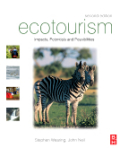
Ecotourism: Impacts, Potentials and Possibilities analyses the impacts of mainstream tourism in first, second and third world countries, and argues the benefits of adopting the philosophical approaches of ecotourism to create a more sustainable tourism industry in every country around the world. Conservation and ecotourism issues are now at the forefront of public opinion. The decline of natural rainforests, loss of endangered species, global warming and land degradation have galvanised public support for conservation. Building on the success of the first edition, this text has been fully revised and updated to include: Updated and new international case studies A new chapter devoted to the theory and technique of Rapid Rural Appraisal (the practice whereby communitiesare empowered to improve their own environment) Questions and further readings at the end of each chapter to facilitate student's learning. Critical analysis of ecotourism. Explores the movement of ideas around post-modern approachesto the field. Using relevant case studies, Ecotourism examines the potential positive social and environmental benefits of Ecotourism and is ideal for bothstudents of tourism and practitioners within the tourism industry.'Ecotourism' will also be of interest to environmental groups, land managers, academics and planners. Introduces students to key concepts and principles that govern ecotourism and applies them to environmental and resource issues Shows how issues surrounding ecotourism relate to environmental and resource problems at local, regional, national, and global level Provides a resource for ecotourism guides, managers and operators and explores a range of international case studiesthat outline best practice in the industry from Antartica, Australia, Americaand Europe
- ISBN: 978-0-7506-6249-9
- Editorial: Butterworth-Heinemann
- Encuadernacion: Rústica
- Páginas: 256
- Fecha Publicación: 12/02/2009
- Nº Volúmenes: 1
- Idioma: Inglés
